Russia is ready to negotiate with Ukraine, the US reveals why Hamas does not want to release female hostages, Nicaragua recalls its Ambassador to Argentina, Niger ends military relations with the EU... are some of the notable international events in the past 24 hours.
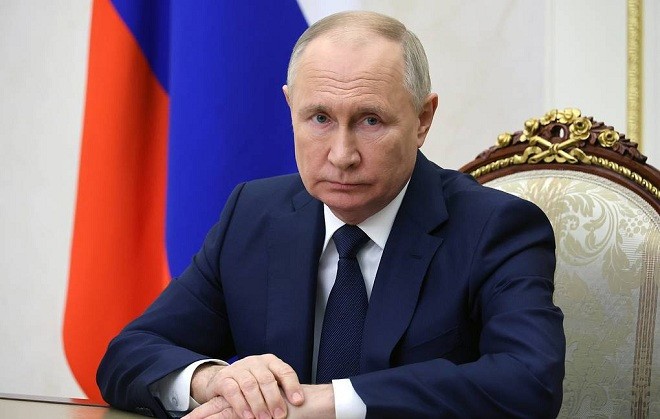 |
| Russian President Vladimir Putin is about to visit the UAE and Saudi Arabia. (Source: TASS) |
The World & Vietnam Newspaper highlights some of the day's international news highlights.
Russia-Ukraine
*Ukraine attacks Russian-controlled oil depots: The Ukrainian military said on December 5 that it had attacked oil depots in the Russian-controlled city of Luhansk a day earlier. The Strategic Communications Department of the Armed Forces of Ukraine said its forces had carried out a "successful attack," but did not provide specific details.
Earlier in the day, Russian state news agency RIA Novosti reported that the Ukrainian military had attacked an oil depot in the area with drones. RIA Novosti quoted Russian-appointed authorities as saying a fire broke out after the attack but was extinguished. (Reuters)
*Kiev announced that it shot down 10 Russian UAVs: The Ukrainian government said on December 5 that its military had shot down 10 out of 17 attack drones launched overnight from Russia.
The Kiev Air Force stressed that the UAVs were shot down “in several areas” across the country. The Ukrainian Air Force also noted that six S-300 missiles were fired at civilian targets in the Eastern Donetsk and Southern Kherson regions.
According to Ukrainian officials, there is currently no information about damage caused by this Russian attack. (AFP)
*Russia ready to negotiate with Ukraine: Izvestia newspaper reported on December 5 that Russia has expressed its readiness to negotiate with Ukraine, even on the territory of a Western country.
This information was given in the context of Hungarian Foreign Minister Peter Szijjártó suggesting that Budapest could play a mediating role between Moscow and Kiev. However, the Russian Foreign Ministry emphasized that Ukraine and its Western partners are not yet ready for dialogue with Russia.
Ukrainian President Volodimir Zelensky earlier signed a law banning negotiations with Russia under President Vladimir Putin.
Experts believe that the role of mediator could be assigned to a country that is not a member of the North Atlantic Treaty Organization (NATO). Hungary, Slovakia and even India have been mentioned as potential mediators. (TASS)
Asia-Pacific
*China affirms that the Taliban in Afghanistan must reform: Chinese Foreign Ministry spokesman Wang Wenbin said on December 5 that the Taliban government in Afghanistan needs to carry out political reforms, improve security and mend relations with neighboring countries before receiving full diplomatic recognition.
Beijing does not officially recognize the Taliban government in Afghanistan, although both sides receive each other's ambassadors and maintain diplomatic relations. In a document on Afghanistan released this year, the Chinese Foreign Ministry said it "respects the independent choices of the Afghan people and respects the religious beliefs and national customs." (Xinhua)
*Thai Prime Minister to visit Japan: Thai Prime Minister Srettha Thavisin will visit Japan from December 14-18 to attend the ASEAN-Japan Summit in Tokyo and celebrate the 50th anniversary of diplomatic relations.
All ASEAN leaders, except Myanmar, have been invited and will attend the special summit chaired by Prime Minister Fumio Kishida. Sources said Srettha will leave for Japan on December 14, two days before the summit, to promote investment and trade with Japan. (Bangkok Post)
| RELATED NEWS | |
 | Buddhism contributes to fostering friendship and solidarity between Vietnam and Thailand |
*North Korea closes embassies in Senegal, Guinea : A South Korean Foreign Ministry official said on December 5 that North Korea has closed its embassies in Senegal and Guinea, a move that appears to be aimed at cutting spending amid economic difficulties.
The latest closures come after Pyongyang closed embassies in Angola, Nepal, Bangladesh, Spain and Uganda in recent months. As of December 5, the total number of North Korean diplomatic missions had dropped from 53 to 46, according to South Korean officials. South Korean officials cited economic hardships caused by prolonged global sanctions as the biggest factor behind the recent closures.
Last month, North Korea said it would close and open new diplomatic missions “in accordance with the changed global environment and national diplomacy,” without giving details. (Yonhap)
*Russian Security Council, Myanmar sign MOU on cooperation : On December 5, the press service of the Russian Security Council announced that this agency and the Myanmar Security Council signed a memorandum of cooperation within the framework of the visit to Myanmar of Secretary of the Russian Security Council Nikolay Patrushev.
The memorandum confirms the readiness for cooperation in various areas between the security agencies of Russia and Myanmar, as well as regular consultations and exchange of views on issues of national, regional and international security.” The meeting was also attended by officials of the Russian Ministry of Defense, the Russian Federal Security Service (FSB) and members of the Russian Security Council.
On the same day, representatives of the ministries of economic development, industry and trade, energy and agriculture held separate meetings with their Myanmar counterparts in the Myanmar capital Naypyidaw. (TASS)
Europe
*Ukraine boosts exports through new corridor on the Black Sea: On December 5, Ukrainian Deputy Prime Minister Oleksander Kubrakov announced that so far Kiev has exported nearly 5 million tons of agricultural products through the new corridor on the Black Sea to replace the previous corridor under the agreement with Russia.
Deputy Prime Minister Kubrakov said a total of 200 ships have transported 7 million tonnes of various goods from Black Sea ports since the corridor was established in August after Russia abandoned the UN-backed Black Sea Grain Initiative.
In addition, Mr. Kubrakov announced that 31 more ships were being loaded at the moment, but did not give details about the specific cargo that would be transported. (AFP)
*Russian President to visit UAE, Saudi Arabia: On December 5, Russian Presidential Advisor Yury Ushakov said President Vladimir Putin will visit the United Arab Emirates (UAE) and Saudi Arabia this week.
The visit comes after the Organization of the Petroleum Exporting Countries and its allies (OPEC+), which includes the three countries, agreed on November 30 to voluntarily cut production by a total of about 2.2 million barrels per day. The oil market reacted with skepticism over whether the voluntary cuts would be fully implemented. Oil prices fell 2% last week after the announcement and continued to fall on December 4.
President Putin has rarely traveled abroad in recent times, mainly to former Soviet countries. His last trip was to China in October. (TASS)
| RELATED NEWS | |
 | President Putin's rare foreign trip, which country was chosen? |
*Russia - Niger strengthen military cooperation: On December 5, the Nigerian government said a delegation led by Russian Deputy Defense Minister, Colonel General Yunis-Bek Yevkurov, met with Niger military leaders in Niamey and the two sides agreed to strengthen military cooperation.
The head of Niger’s military administration, General Abdourahamane, said the two sides “signed documents to enhance military cooperation between the Republic of Niger and the Russian Federation.” This is the first official visit by a member of the Russian government since the July coup in Niger.
In another development, Mali's Finance Minister Alousséni Sanou said that a Russian delegation also met with military leaders in Bakamo on December 4. (Sputnik News)
America
*North Dakota Governor withdraws from White House race: On December 5, North Dakota Governor Doug Burgum abandoned his bid for the Republican nomination to run for US President in 2024 after his support rate in polls was continuously in the single digits, making him ineligible to participate in the third and fourth debates of the party.
Burgum, 67, is the latest Republican candidate to drop out of the race, following former South Carolina Sen. Tim Scott, Vice President Mike Pence, Miami Mayor Francis Suarez, former Rep. Will Hurd and businessman Perry Johnson. (Washington Post)
*Former US Ambassador spied for Cuba for 40 years: On December 4, US State Department spokesman Matthew Miller announced that Washington will work with partners in the intelligence community to assess any impact on national security after the former US Ambassador to Bolivia was accused of spying for Cuba for more than 40 years.
Earlier the same day, the US Department of Justice said that Victor Manuel Rocha, who served as US Ambassador to Bolivia from 2000-2002, had been charged with crimes including acting illegally as a foreign spy and using a false passport. (Reuters)
*Nicaragua “immediately” recalls Ambassador to Argentina: On December 5, Nicaragua recalled its Ambassador to Argentina, Carlos Midence, to protest the statements of the administration of new extremist President Javier Milei against the regime of President Daniel Ortega.
In a statement, Nicaraguan Foreign Minister Denis Moncada stated: “In light of the repeated statements and expressions from the new authorities, the Government of Nicaragua... has recalled its Ambassador... ". In addition, Foreign Minister Moncada emphasized that this recall decision will take effect "immediately".
Previously, President Milei's administration did not invite his counterpart Ortega, as well as the leaders of Cuba, Venezuela, North Korea and China, to attend the inauguration ceremony on December 3. (AFP)
Middle East – Africa
*Why Hamas does not want to release female hostages: US State Department spokesman Matthew Miller said on December 5 that Hamas may delay releasing female hostages because Hamas does not want these hostages to speak publicly about sexual violence.
Israel resumed its military operation on December 1 because Hamas had not released all the women it was holding. “It appears that one of the reasons Hamas did not want to release the women it held hostage and the reason the temporary ceasefire collapsed was because Hamas did not want the women to report what had happened to them while they were being held,” Matthew Miller told reporters. (AFP)
*Hamas has been planting spies in the IDF for many years: The Guardian (UK) on December 5 quoted an Israeli intelligence source as saying that among the documents seized from the Hamas gunmen who attacked Israel on October 7, a map of the military base of the Israel Defense Forces (IDF) was discovered.
According to the source, the map is more detailed than the ones the IDF has, raising suspicions that it could only have been drawn with the help of sources inside Israel. According to the Guardian , the map “was clearly drawn by a Hamas spy” because of its level of detail, raising suspicions that it was specifically designed for the purpose of attacking the base.
“The IDF has concluded that Hamas planned the attack for years and drew detailed maps with the help of spies inside Israel,” the newspaper said. (Reuters)
*Niger ends military relations with EU: On December 5, the Niger Ministry of Foreign Affairs announced that the Niger government had ended its military partnership with the European Union (EU), withdrawing permission for the EU to deploy the EUCAP Sahel Niger mission.
EUCAP Sahel Niger was launched in 2012 to help security forces combat insurgents and other threats. According to its website, about 120 European military personnel are deployed there on a regular basis.
Niger's military government, which took power in a coup in July, has also asked French troops - who are helping Niger fight Islamist rebels - to withdraw. (AFP)
| RELATED NEWS | |
 | France begins process of withdrawing troops from Niger |
*Hamas attacks Israeli missile base “containing nuclear weapons”: The New York Times reported that a rocket launched from Gaza on October 7 hit an Israeli military base believed to house missiles capable of carrying nuclear warheads. The impact of the rocket at the Sdot Micha base in central Israel caused a fire that spread near where the missiles and other sensitive weapons were stored.
Israel has not officially acknowledged possessing nuclear weapons, but Israeli sources, US officials and satellite imagery analysts all agree that the country has at least a small number of nuclear weapons. (NYT)
*US sells radar system worth 582 million USD to Saudi Arabia: The US Department of Defense announced on December 5 that the US State Department has just approved the sale of a powerful aircraft detection radar system worth 582 million USD to Saudi Arabia.
The Pentagon's announcement also said that contractor L3 Technologies (LHK.N) will be the primary supplier for the RE-3 Tactical Air Surveillance Aircraft System Modernization project and related equipment. (CNN)
*Nigerian army bombs wrong "address", 30 civilians killed: On December 5, a local official said the Nigerian army mistakenly bombed a village, killing at least 30 civilians.
The Nigerian military has admitted “mistakes”, saying the incident was part of a military operation to root out terrorists in the area. However, due to a serious miscalculation, the airstrike hit a residential area rather than the intended target. Local media reported that at least 30 people were killed and dozens more were injured and taken to hospital. (AFP)
*Israel investigates possible "foreknowledge" of Hamas attack on October 7: Israeli authorities are investigating the case of US researchers who say some investors may have known in advance of Hamas' plan to attack Israel on October 7 and used that information to profit from Israeli stocks.
Research by New York University law professors Robert Jackson Jr. and Joshua Mitts of Columbia University found significant short-selling activity in stocks ahead of the attacks. “In the days before the attacks, traders appeared to have anticipated the events that were coming,” the professors wrote in their paper. “And just before the attacks, short-selling activity in Israeli stocks on the Tel Aviv Stock Exchange (TASE) increased significantly.” (Reuters)
*Iran denies allegations related to attacks in the Red Sea: On December 5, Iranian Foreign Ministry spokesman Nasser Kanaani denied US accusations that Iran "was behind a series of attacks by Houthi forces in Yemen" on several ships in the Red Sea.
Mr. Kanaani made the above statement in response to the statements of the US Central Command (CENTCOM) on December 3, which accused Iran of "fully supporting four attacks carried out by Houthi forces on three commercial vessels in international waters in the southern Red Sea".
The Iranian Foreign Ministry spokesman stressed that the decisions of this resistance force in the region were in response to US support for Israel, and declared that “continued crimes in Palestine will be responded to.” (Gulf News)
Source


![[Photo] Prime Minister Pham Minh Chinh works with the Standing Committee of Thai Binh Provincial Party Committee](https://vphoto.vietnam.vn/thumb/1200x675/vietnam/resource/IMAGE/2025/5/12/f514ab990c544e05a446f77bba59c7d1)
![[Photo] Prime Minister Pham Minh Chinh receives Swedish Minister of International Development Cooperation and Foreign Trade](https://vphoto.vietnam.vn/thumb/1200x675/vietnam/resource/IMAGE/2025/5/12/ae50d0bb57584fd1bbe1cd77d9ad6d97)



![[Photo] Prime Minister Pham Minh Chinh starts construction of vital highway through Thai Binh and Nam Dinh](https://vphoto.vietnam.vn/thumb/1200x675/vietnam/resource/IMAGE/2025/5/12/52d98584ccea4c8dbf7c7f7484433af5)


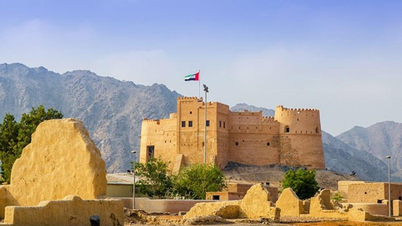




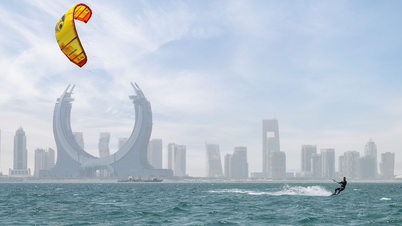
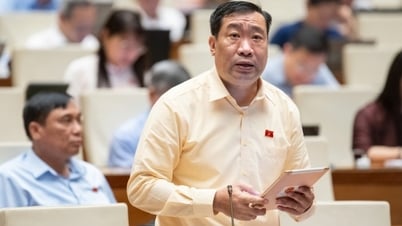
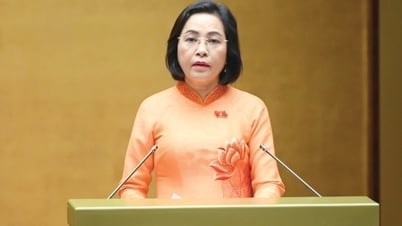








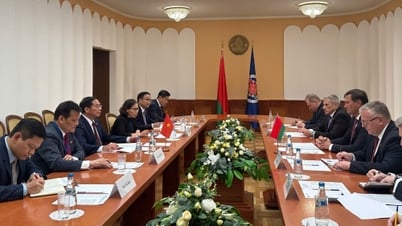

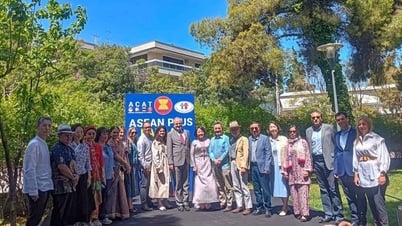
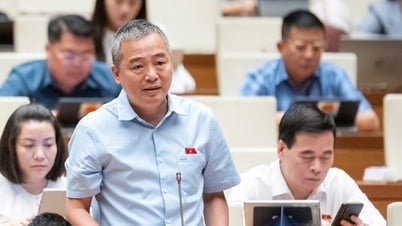

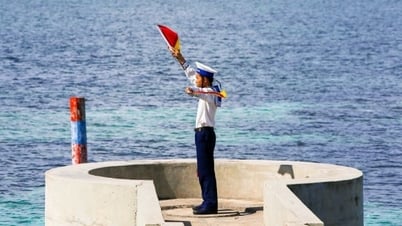




















































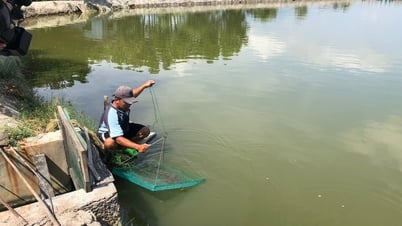


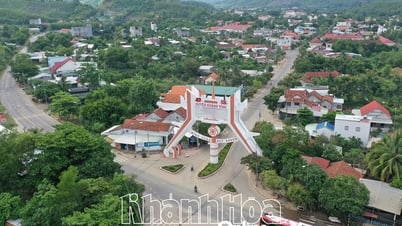










Comment (0)